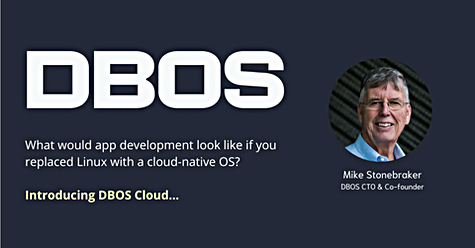DBOS, a developer of what it claims is the “world’s first cloud-native operating system,” has raised $8.5 million in seed funding and released its first product.
The Cambridge, MA firm is co-founded by Turing Award laureate and Postgres creator Mike Stonebraker, and Databricks co-founder and CTO Matei Zaharia, along with a joint team of MIT and Stanford computer scientists. It has announced the release of DBOS Cloud, a transactional serverless application development platform, which it says make cloud applications “vastly easier to develop, deploy, and secure.”

The funding was led by Engine Ventures and Construct Capital, along with Sinewave and GutBrain Ventures. Engine Ventures general partner Reed Sturtevant now joins Andy Palmer, Peter Kraft, and Stonebraker on the DBOS board.
“Cloud applications have been running on decades-old operating systems, the equivalent of driving cars and trucks cross-country on dirt roads – DBOS provides a necessary and overdue overhaul,” said Sturtevant.
Based on years of joint MIT-Stanford research and development, the company created DBOS (database-oriented operating system), which runs operating system services on top of a high-performance distributed database. The result is said to be a scalable, fault-tolerant, and cyber-resilient foundation for cloud-native applications, with the added ability to store all state, logs, and other system data in SQL-accessible tables.
“The cloud has outgrown 33-year-old Linux, and it’s time for a new approach,” said Stonebraker. “If you run the OS on a distributed database as DBOS does, fault tolerance, multi-node scaling, state management, observability, and security get much easier. You don’t need containers or orchestration layers, and you write less code because the OS is doing more for you.”
DBOS Cloud is initially available for developers to build and run serverless functions, workflows, and applications. They are promised reduced complexity of development, deployment, and operations as a result, while also “increasing cyber security and cyber resilience.”
Zaharia said: “With DBOS, developers can build applications in days that now take months on conventional cloud platforms. They can also seamlessly use the same tools they use today, so there is very little learning curve before benefiting from the rapid development, guaranteed transactions, and increased cybersecurity of DBOS.”
DBOS Cloud includes support for stateful functions and workflows, built-in fault tolerance with “guaranteed” once-and-only execution, time-travel debugging, SQL-accessible observability data, and the enablement of cyber attack self-detection and self-recovery.
“The cybersecurity implications of DBOS are truly transformative,” added Michael Coden, DBOS co-founder and former head of cyber security practice at BCG Platinion. By simplifying the cloud application stack, DBOS is said to “greatly reduce” the attack surface of cloud applications. On top of that, DBOS enables self-detection of cyber attacks “within seconds” without the use of expensive external analytics tools. And it can restore itself to a pre-attack state “in minutes.” Coden enthused: “It’s a DevSecOps game-changer.”
The company said it will use the raised funds to grow its engineering team and to enhance the transactional computing platform and its components.
Stonebraker spoke to sister publication The Register in December about his new organization, read it here. And elsewhere in our family of publications, TheNextPlatform took a deep dive on DBOS, and that article is here.








